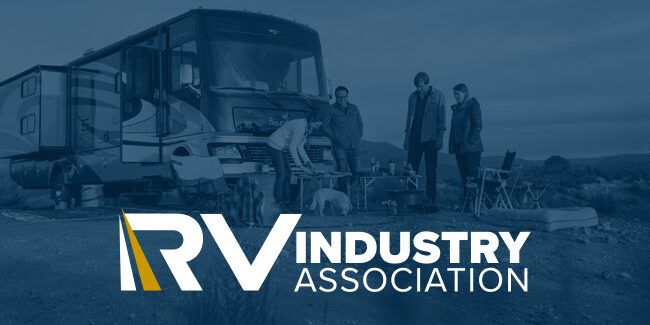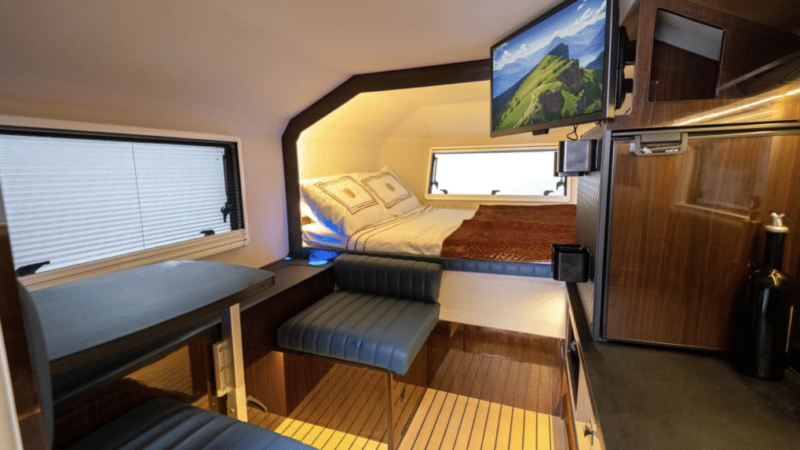Study: Millennial Professionals Embracing Full-Time RVing

Progressive Insurance recently surveyed 501 Americans who live either full- or part-time in RVs to see what life is like on the road, why they choose full-time RV living, and how they manage day-to-day activities such as work, school, receiving mail, and voting. The survey also asked about their biggest challenges to finding out what it’s really like to live in an RV.
The results show that half of RVers are under 45 and highly likely to be traveling with kids. These nomads have embraced RV life for a number of reasons, but they mainly do it to explore the country and have adventures while working.
Key takeaways:
- Remote-working Millennials are a major force on the road
- Millennials are highly likely to travel with children under 18
- A majority of RVers plan to stay on the road for the foreseeable future
More RVers — and More Millennials — are Seeking an Adventurous Life on the Road
Restricted travel and remote work options during the pandemic may have spurred record-breaking RV purchases, but the trend was already on the upswing. RV ownership has increased 62% over the last 20 years, with 11.2 million households owning RVs, according to a 2021 study by Go RVing. The same study shows that RV ownership has grown significantly among both the millennial and Gen Z generations, or people under the age of 45. Progressive Insurance has also seen a steady increase in the number of full-time RV policies sold since as early as 2009 — proving yet again that it’s not just the pandemic that’s fueling this lifestyle.
In our 2022 survey, half of RVers are 18-44, and only 18% are 65 or older, representing a shift in traditional RV life. No longer is RVing just for senior couples who like to cruise to warm weather spots.
Saskia Boogman, Director of Social and Content for KOA Campgrounds, says it’s easy to say the pandemic caused the shift, but it’s been developing for years. “More people were forced to work at home, and I think that just accelerated the change that was already occurring,” says Boogman.
For younger professionals, the allure of #RVLife has made RVing aspirational. And the ease of remote working and attending virtual school has made it much more realistic to pack up the RV and hit the road for an adventure of a lifetime.

Remote Work has Opened Up Full-Time RV Living to Younger RVers
One consequence of the demographic shift to younger RVers is that more people work remotely while traveling. Our survey found that 54% of all RVers are active remote workers. That number increases slightly to 59% for 35–44 but jumps dramatically to 70% for the 25–34 demographic.
Christopher Monaco, manager of Digital Design at Progressive, and his wife, who are 40 and 42, represent a typical millennial working couple living in their RV for months at a time.
The Monacos bought their first travel trailer in 2018 so they could travel freely without boarding their dogs or finding pet-friendly accommodations. Once the pandemic hit and the company went fully remote, Chris experimented with taking longer trips while working from the road.
“I had this thing sitting in the driveway and I was like, I’ve got to try this now or I’ll never know what it’s like to be out on the road,” says Monaco.
After a three-month trip to Florida in 2022, Monaco upgraded their small teardrop trailer to a Class C motorhome. He doesn’t plan to stop traveling anytime soon and expects to eventually upgrade to an even bigger rig.
“I don’t see myself selling my house yet,” he says. “But I do see myself wanting to continue to explore the United States.”
Younger RVers Shift Campground Culture and Amenities
RV clubs and campsites are experiencing these same demographic shifts and are changing to meet the needs of younger RVers.
Georgianne Austin, the Communications Director of Escapees RV Club, a community and support network for RVers, says that membership has quickly grown among younger remote workers. Escapees even created a job board to help RVers find remote work and established a group called Xscapers that connects younger enthusiasts who work on the road.
“We’ve seen a lot of growth where people didn’t have to show up to the office anymore, or they were living in really high-cost areas of the country and no longer had to because work didn’t keep them pinned there,” she says. “The freedom to travel and do other things has really ignited a lot of growth in that area.”
At KOA Campgrounds, Boogman says this demographic shift has influenced changes in the amenities and programs offered. “We’re seeing more adult-mingling type of activities being added, whether that’s wine tastings or potlucks where adults can meet new people,” she says.

Families Seek Freedom while Juggling School and Work
Another result of the shifting demographics is that these younger active remote workers are taking their families along for the ride. More than three-quarters of RVers (77%) aged 35–44 travel with children.

Packing the kids into a smaller home on wheels may seem daunting, but many families embrace the challenge, particularly since there are more school options available than ever before. In our survey, 19% of children living in RVs are homeschooled, and 49% take virtual classes. About a third (31%) of families stay close to a home base so their children can attend school, saving big trips for the summer months.
Rob and Tosha Lackey, who are 41 and 38, took to the road full-time in January 2020 with their children Carter, 15, and Edith, 10. They travel year-round, running a custom racing gear business that takes them to motorcycle tracks across the country. The kids attend an Oklahoma-based virtual school and have made friends at events where they see the same families repeatedly. During our interview, they crossed into Arizona — a milestone for their kids who’ve now been to all 48 states in the contiguous U.S.
Just before the pandemic, the couple embraced #RVLife, quitting their corporate jobs, buying an RV, and hitting the road, even though they had never RVed before. After about 18 months, they decided to sell their home in Oklahoma and fully commit to RV living.
Pets are Part of the RVing Family
Our survey revealed that pets are a big part of RV life, which is another benefit of traveling via RV. Families can easily integrate pets into the lifestyle. At KOA, pets have become so prevalent that many campgrounds have expanded their pet-friendly offerings with dog parks and individual pens at camp and RV sites. Learn more tips for RVing with pets.

Families are much more likely to have pets along for the ride. 85% of families travel with a dog, 52% have a cat, and 5% travel with a rabbit.
The Lackeys are one of those families. Their bunny, Thumper, didn’t like traveling in the RV at first, but he’s adapted and is a source of comfort for the entire family. “He makes us all happy,” says Tosha.
The best pet safety while driving is to keep Thumper in his cage as they move from place to place. So far so good, as he has had no complaints.
Source: https://rvbusiness.com/study-millennial-professionals-embracing-full-time-rving/






